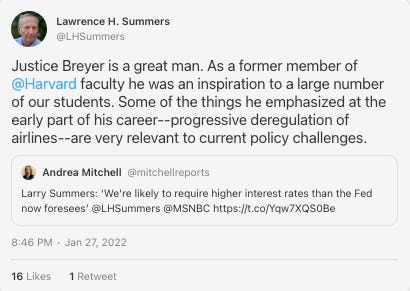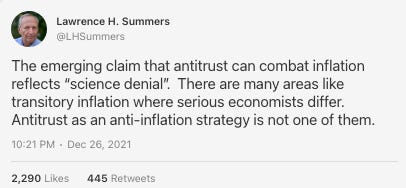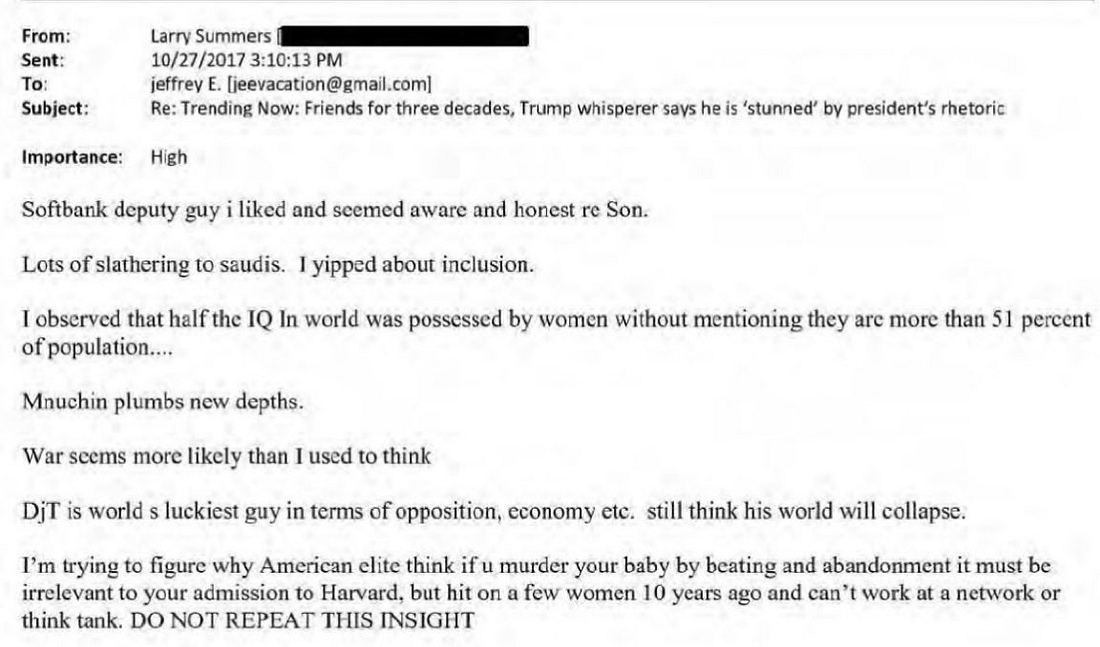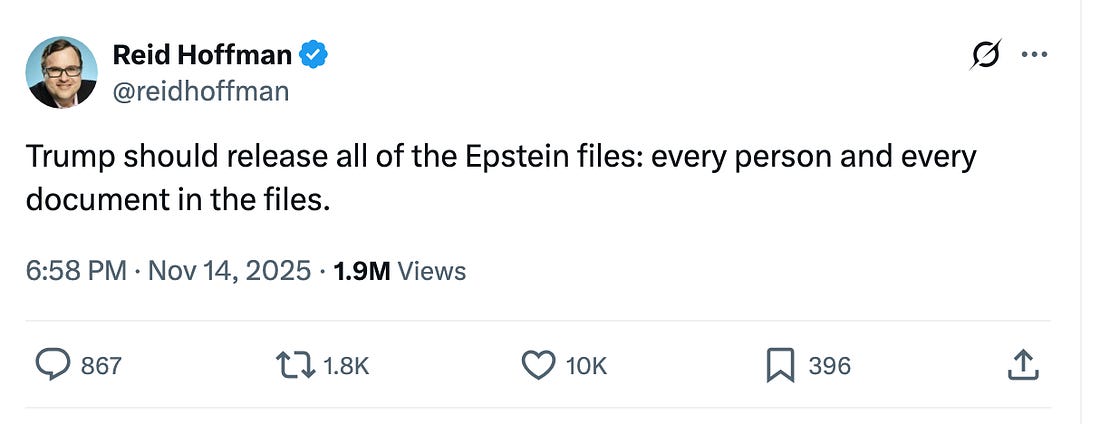The Blast Radius of Jeff EpsteinLarry Summers controlled two Presidents, Bill Clinton and Barack Obama, and organizes economists and oligarchs. Joe Biden talked to him all the time. And now he's in a serious scandal. Or is he?I had something else planned to write for this week, but the House Oversight Committee released emails from dead sex trafficker/blackmailer Jeff Epstein, and they are wreaking havoc in D.C., with Trump exposed and then turning around and ordering the Justice Department to investigate prominent Democrats whose names came up. Trump’s relationship with Epstein is a significant political problem and is getting most of the headlines. But this scandal is also having an important effect inside the pro-monopoly faction of the Democratic Party. The single most important neoliberal thinker of the last forty years - economist Larry Summers - had an extensive and deep political and personal relationship with Epstein. He was reportedly on Jeff Epstein’s plane, nicknamed the ‘Lolita Express,’ when young girls were present, and he often discussed his personal and political problems with Epstein. It’s important to offer some context on this sordid affair, and why it matters. There’s a tabloid aspect to the Epstein scandal, since it’s a lurid story of a mysterious former high school who somehow became worth $600 million, was convicted of sex trafficking in 2008, and yet for years afterwards, had connections to many of the most important monopolists and politicians in the world. Bill Gates was a confidante of Epstein, so was Google co-founder Sergei Brin, Microsoft board member and “Abundance” backer Reid Hoffman, and private equity titan Leon Black. So were Bill Clinton and Donald Trump, and Ehud Barak. In other words, Summers and a bunch of powerful political elites are enmeshed in a scandal involving a network of, well, there’s no nice way to put it, globalist pedophile billionaires. But it isn’t merely a tabloid story. It is also an important illustration of how our economic order functions. The Courier created a searchable database of the so-far released files, and if you go through some of it, it becomes clear that this elite network was as likely to be organizing African politics, the U.S. Treasury Secretary slot, or ideas around monopolies in the information economy as discussing sexual adventures. The Epstein files serve as a sort of sex offender registry list for the powerful, but more than that, a dramatic illustration of the two-tiered system of justice we despise. It shouldn’t be hard to talk about this scandal. I mean, many of the people who went to Epstein’s island, like Reid Hoffman, are bitter foes of our work. Not only did he organized the monopolization strategy of LinkedIn, and not only is he on the board of Microsoft, but he was Kamala Harris’ most important financial backer and the organizer of a campaign to have FTC Chair Lina Khan fired. In 2014, he went to Epstein’s private island, and has slept over at Epstein’s notorious townhouse. And yet, anti-monopolists largely haven’t. And the reason, I think, is that even we were subject to the soft power of these people, persuaded in some way that ‘conspiracy theories’ of a globalist network of creepy weirdos who run the world was somehow out of bounds. And it’s Summers who really brings it home just how powerful these guys are, and how they orchestrated their cover-up in plain site. How did they do it? How did this they convince us not to believe our lying eyes? And will they be able to continue this strategy, and retain their power despite this remarkable expose of how they operate? To answer this question, we have to start with Summers himself. The Fabulous Career of Larry SummersThere is no single architect of our modern order, but if you were forced to pick one, you could do a lot worse than Larry Summers. In many ways, he is simply too big to be disgraced, too big to fail. Born in the 1950s to two economists, Summers was always expected to do great things. Both of his uncles won Nobel prizes in economics. Summers, following the family path, went to MIT and Harvard, where he was mentored by future AIG board member and Reagan advisor Marty Feldstein. While there, Summers and a group of young thinkers, like Paul Krugman, Jeff Sachs and Oliver Blanchard, bonded, and have in the last forty five years become the dominant gatekeepers of economics in the U.S. and Europe. In the early 1980s, Summers served in the Reagan administration and became an economics professor at MIT, before starting to give advice to Democrats, notably in the Michael Dukakis campaign in 1988. He was chief economist at the World Bank, and entered the Clinton administration at Treasury. Under Clinton, Summers bonded with Alan Greenspan and Robert Rubin, the three men nicknamed the ‘Committee to Save the World’ by Time Magazine due to their ability to bail out U.S. banks involved in the Mexican and East Asian financial crises. Summers eventually worked his way up to Treasury Secretary, where he organized the deregulation of derivatives and the end of Glass-Steagall, helped broker the transformation of the Soviet Union into an oligarch dominated Russian state, and served as a key administration lobbyist for NAFTA and China’s entrance into the World Trade Organization. After the Clinton administration, Summers became the President of Harvard University, perhaps the single most influential role in U.S. civil society, before serving as a managing director of the hedge fund D.E. Shaw for a few years. He was still heavily involved in central banking policy, influencing financial regulators to ignore speculation and fragility in the financial system. In 2005, at the Jackson Hole conference of central bankers, he famously mocked the idea that the U.S. financial system was heading for a fall, calling one prescient economist who predicted the crisis a “Luddite.” Indeed, Summers pushed a neoliberal set of ideas in every position he occupied. For instance, under Clinton, Summers was a skeptic of the government’s case against Microsoft in the 1990s. As another example, when Stephen Breyer stepped down from the Supreme Court in 2022, Summers lauded Breyer’s policy work prior to going on the bench, which was “progressive deregulation of airlines.” And he is a booster of today’s big tech giants, which follows from his Schumpeterian vision of the economy. In 2002, he wrote a paper arguing that monopolies were inevitable in our information society, and that monopoly profits had to be “big enough to reward past innovation.” He also suggested that price discrimination was progressive, and it “may enable a firm to make a profit by charging high prices in its well-off core market, and to add to that profit--while increasing social utility--by charging low prices to the poor.” Pretty much every cliche you hear about Google, from ‘competition is just a click away’ to arguments about efficiency, are in Summers’s work. Under Obama, he served as the head of the National Economic Council, where he was the architect of the U.S. response to the financial crisis. He nearly became the head of the Federal Reserve in 2024, before being blocked by Elizabeth Warren. And the rumors were that when he worked in the Obama White House running economic policy, he fought vigorously against more assertive antitrust, especially in finance. After the Obama era, Summers served as a lightning rod of controversy, blamed for the policy framework that led to Trump, or alternatively lauded as the man who saved America from the Great Depression. When Joe Biden got elected, Summers seemed to be on the outs. But he wasn’t. Summers wormed his way into heavy involved in his administration, providing the key political leverage for the Inflation Reduction Act. As Politico put it, “When the White House sought help crafting crucial tax-raising portions of the health care, climate and tax bill, one man was often on the other end of the phone line and email chains: Larry Summers.” He regularly briefed, and still briefs, House and Senate Democrats privately on how to understand economic policy. During the Biden era, Summers also led the factional fight against anti-monopolists, singling out Lina Khan as especially dangerous. When the Antitrust Division and FTC came out with new merger guidelines in 2023, there was Summers, on Bloomberg, make the case that these changes were a “war on business.” Throughout the last administration, Summers played a key role in preventing a coherent approach to the exploitation of corporate power. For instance, when some noticed that corporate profits were related to inflation during the early post-Covid years, Summers slapped down that theory, even though most of those price increases were accruing to corporate profits. Here’s what Summers said in 2021 . And that didn’t end after the Biden administration. Today, Summers is involved in promoting the Abundance movement and in June, the New York Times showed that he was advising on something called Project 2029, a project to design the agenda for the next Democratic President. It goes without saying that his predictions have often been spectacularly wrong. He thought China would become more democratic if the U.S. opened up its markets to that country, which didn’t happen. He believed free trade would benefit American workers. He argued that monopolies in the information age were fleeting. in the summer of 2022, he said that to bring down inflation, the U.S. had to entertain a massive recession to get to 10% unemployment. But bad predictions don’t matter; in some ways, they are a reflection of his power. The LegacyToday, Summers is a professor at Harvard, the Vice Chair of the immensely influential Peterson Institute for International Economics, a distinguished senior fellow at the Center for American Progress, and a contributing writer at the New York Times. He’s also a board member of OpenAI, and has a well-trod path in finance and crypto. And his disciples are everywhere. Sheryl Sandberg was his student and chief of staff. He mentored Obama CEA Chair Jason Furman. Former Treasury official Natasha Sarin was his student. The rumors were that he controlled access to a number of key economic journals, which meant that he was in charge of the careers of young economists. Summers serves as the most important validator for capital, never wrong but never in doubt, an excellent organizer and politician whisperer, and deeply corrupt. I was told an anecdote a few years ago about Summers. He gave a talk at a New York or D.C. economic club, with the audience composed of various private equity guys and billionaires. And afterwards, they surrounded him like fangirls, hanging on his every word. When Summers speaks, and he speaks often as a contributor to Bloomberg TV and the New York Times, the oligarchs listen. That said, Summers has been held accountable twice in his life. The first time is when he was pushed out of the Harvard Presidency for saying that women have innately different abilities in math and science. “There is relatively clear evidence,” he said in a 2005 speech, “that whatever the difference in means—which can be debated—there is a difference in the standard deviation and variability of a male and female population.” These comments sparked widespread anger within the faculty, and led to his resignation, (though he also lost a few billion dollars of Harvard’s endowment on risky derivatives bets.) The second time is when Barack Obama tried to make him the Chair of the Fed, but a coalition led by Senator Elizabeth Warren blocked his nomination. But being denied the Federal Reserve Chair, while it was humiliating to Summers, meant that he had to settle merely for being one of the most influential men in the world. So not really much accountability there. Epstein and SummersNow, however, there’s a scandal that is hard to deny. Summers had a longstanding and well-known relationship with Epstein. The Wall Street Journal did stories in 2023 about the two of them, showing how Summers asked Epstein for helping raising money for his wife’s poetry nonprofit. He flew to Epstein’s island four times on Epstein’s private jet, nicknamed the “Lolita Express.” And the new releases show their relationship was close, and that Summers and Epstein discussed dating and sex, and emailed as late as 2019, a few months before Epstein went to prison and died. There are many emails between the two men, they were clearly good friends. But I was most struck by the note he sent to Epstein in 2017, in which he proceeded to joke about female IQs, and lamented how men who “hit on a few women 10 years ago” can’t work at a network or think. He concluded with phrase, “DO NOT REPEAT THIS INSIGHT.” Being unapologetically associated with Epstein, and having these kinds of emails released, would be enough to destroy most people’s reputations. There’s clearly a lot more between the two men, information that hasn’t been released. But the power of concentrated capital is very real. For a few months, I’ve been wondering why Joe Biden didn’t release more information about Epstein. Yes there are legal constraints, but the real answer, which seems pretty obvious, is that he wanted to protect Bill Clinton and Larry Summers. But another more important question is why anti-monopolists never demanded their release. Yes, it’s vague and boundless, with lots of questions and allegations, in a shadowy world of blackmail, sex trafficking, and espionage. So discussing it does have a sort of “conspiracy theory” quality. But that’s no excuse. Will There Be Accountability for Summers?I honestly don’t know if the Epstein scandal will tar Larry Summers or any of the other powerful men implicated in it. Trump has so far escaped accountability, as has Bill Clinton. Epstein associate Billionaire Reid Hoffman, who funds a large number of Democratic politicians, is play-acting as a martyr. And economic journalists have been afraid to associate Summers with it, who is still a contributor to the New York Times and Bloomberg. So far, the various Summers-affiliated organizations are in turmoil over what to do. According to the American Prospect, Larry Summers is heavily involved in a think tank called the Center for American Progress, which is trying to build out an agenda for the next President.
I emailed several organizers of this project who had been named in the New York Times as participants a few months ago - former Biden domestic policy council Chair Neera Tanden, former National Security Advisor Jake Sullivan, New America’s Anne-Marie Slaughter, Third Way’s Jim Kessler, and Brown University’s Marc Dunkelman. None of them responded, though there are behind-the-scenes attempts to distance themselves from Summers. This moment is a good illustration of the utter disgrace facing our institutional fabric. And it’s fostered some self-reflection on my part, why I didn’t take this sordid behavior more seriously. At some level, I just could not fathom that these men were would act the way they did. It just couldn’t really be that obvious and bad, could it? But yes, it was. I don’t have a full answer for why we didn’t take this scandal more seriously. I think there’s a way in which we coded ourselves as ‘technocrats’ to avoid factional disputes, instead of fully embracing the moral reform that truly animates the populist framework. After all, going up against Summers in this particular way means that Barack Obama tried to make the close affiliate of a sex trafficker the most powerful economic actor in the world. And that was really hard to suggest in Democratic circles without being pushed out as some sort of quack. The truth is, from the Abundance movement to the pro-monopoly financial and economic group to the AI oligarchs, operates a class of human beings who feel completely insulated from any normal sense of political obligation to other Americans. Sam Bankman-Fried was a billionaire fraud and a deviant quack but he poured cash into an elite cult, Effective Altruism. EA turned into the creepy elite AI world at Anthropic, as well as Abundance, a New York Times-driven movement that is right now making a huge play to dominate politics, free from accountability from their association with him. Larry Summers is the legacy of decades of this sordid behavior. It’s not that these people are deviants, or have engaged in shameful personal behavior, or have abused power. These things happen, all the time, in every society. It’s that these men were so cavalier that they could get away with what they were doing, because they realized no one in elite circles could even imagine they might be as gross as they actually are. They bet on our snobbery, on how we looked down on QAnon conspiracy theorists, and they were right. Hopefully, we will stop seeing our two-tiered justice system, and this insane elite world or insulated weirdos, as a conspiracy theory beneath our attention. It’s not. We are living in the world they’ve created, and it’s a world we must see clearly, so we can take it apart and restore some sense of moral order. Thanks for reading! Your tips make this newsletter what it is, so please send me tips on weird monopolies, stories I’ve missed, or other thoughts. And if you liked this issue of BIG, you can sign up here for more issues, a newsletter on how to restore fair commerce, innovation, and democracy. Consider becoming a paying subscriber to support this work, or if you are a paying subscriber, giving a gift subscription to a friend, colleague, or family member. If you really liked it, read my book, Goliath: The 100-Year War Between Monopoly Power and Democracy. cheers, Matt Stoller This is a free post of BIG by Matt Stoller. If you liked it, please sign up to support this newsletter so I can do in-depth writing that holds power to account. |





